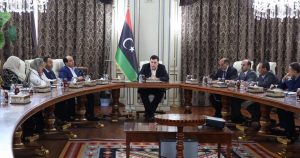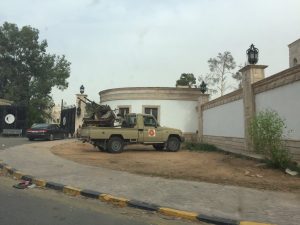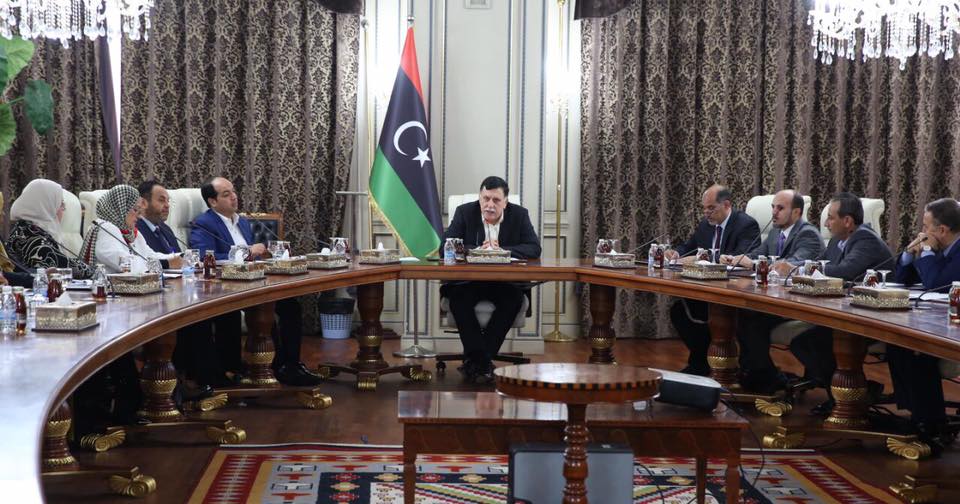By Moutaz Ali.

Tripoli, 15 October 2016:
Across Tripoli, extra check points were springing up this evening as the Presidency Council reacted angrily to the attempted coup by former members of Libya Dawn’s National Salvation government, ordering the arrest of the ringleaders.
As darkness fell, there were unconfirmed reports of skirmishes between armed groups.
PC chief Faiez Serraj, who had been with his colleagues in Tunis yesterday when Khalifa Ghwell launched his coup by seizing the Rixos buildings, chaired a meeting this afternoon at the prime ministry building in the capital’s Railway Road.
Ghwell, whose government melted away after Serraj and other members of the Presidency Council landed in Tripoli on 30 March, said in a broadcast last night that that UNSMIL-backed PC had undermined Libyan unity and was a pawn in the hands of foreign powers that wanted to divide Libya.
He was flanked by Awad Abdul Saddeq, the former GNC’s first deputy president, and Ali Ramali, head of the presidential guard, originally formed to protect the GNC. Ghwell said that the PC was fired. It had been given an opportunity and it had failed. He ordered all government ministries to once again report to him.

This evening, Serraj’s meeting included Government of National Accord acting ministers for Interior, Defense, Planning, Local Government and Transport. It was interior minister Aref Khojja who presented a report on his plans to end the coup and take control of the security situation in the capital.
The PC’s media centre said that the meeting had also discussed the problems of daily life in the city and continued insecurity, which today saw another targeted kidnapping by an armed gang.
On Friday night, it was a couple of hours before the PC responded with a statement on the Rixos coup.
“The seizure of the High State Council HQ by an armed group” it said, “establishes chaos and opens the doors for everybody to ride roughshod over the institutions of the state.” It added that the Interior ministry and the Attorney General had been instructed to arrest all those involved.
The High State Council, which has been using the Rixos as its headquarters, also launched a broadside, accusing Ghwell and Saddeq of leading outlawed militias. It demanded that the PC act to take back the building and arrest everyone involved.
There was also international condemnation of the coup. Jonathan Winer, US President Obama’s special envoy to Libya messaged “People of Libya must choose their path: civil conflict or negotiations & compromise. We join others in condemning any/all efforts at coups”.
UNSMIL chief Martin Kobler slammed the Rixos coup and insisted that the Libyan Political Agreement remained the only framework for a peaceful Libyan solution. He urged all political stakeholders the unite behind it.
His statement was backed by the British ambassador Peter Millett.
From Brussels came EU censure saying that the Libyan people would be the main victims of further disorder and the spiral of violence that would come from an attempt to seize power by force.
It called on the PC to strike a compromise on an inclusive new Government of National Accord on which the House of Representatives should vote in a fair and orderly manner.
For ordinary people struggling to get by in a capital plagued by power cuts, rising prices, lack of cash, a falling currency and persistent insecurity, there was general indifference to the Rixos coup.
“Both sides don’t seem to care about the hard times through which we are currently going” Mohamed Hadia, an accountant told the Libya Herald.
Two others, Mohamed and Siraj said that coup had been illegitimate but added: “These people have all driven us crazy. We are no longer able to recognise who actually has the right to govern us! Actually we don’t care who is in charge, but we’ll support anyone who can provide us with security and services”.








